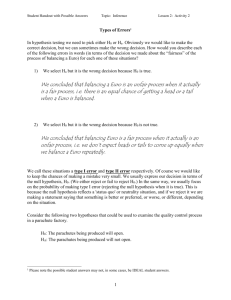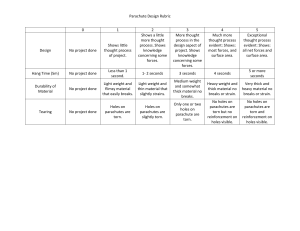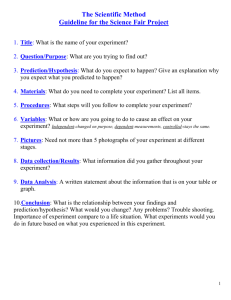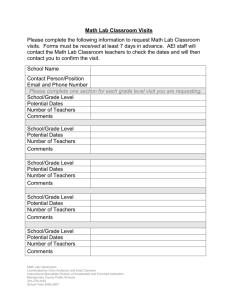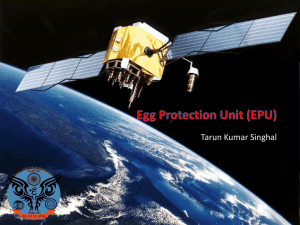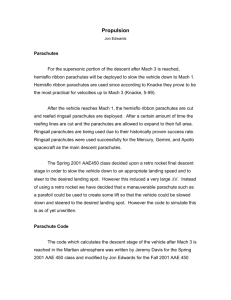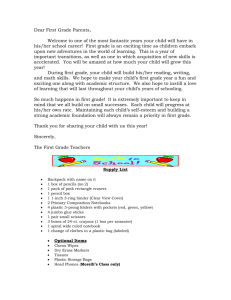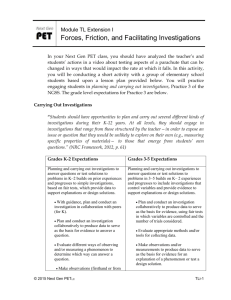Session Six and Seven Revised
advertisement
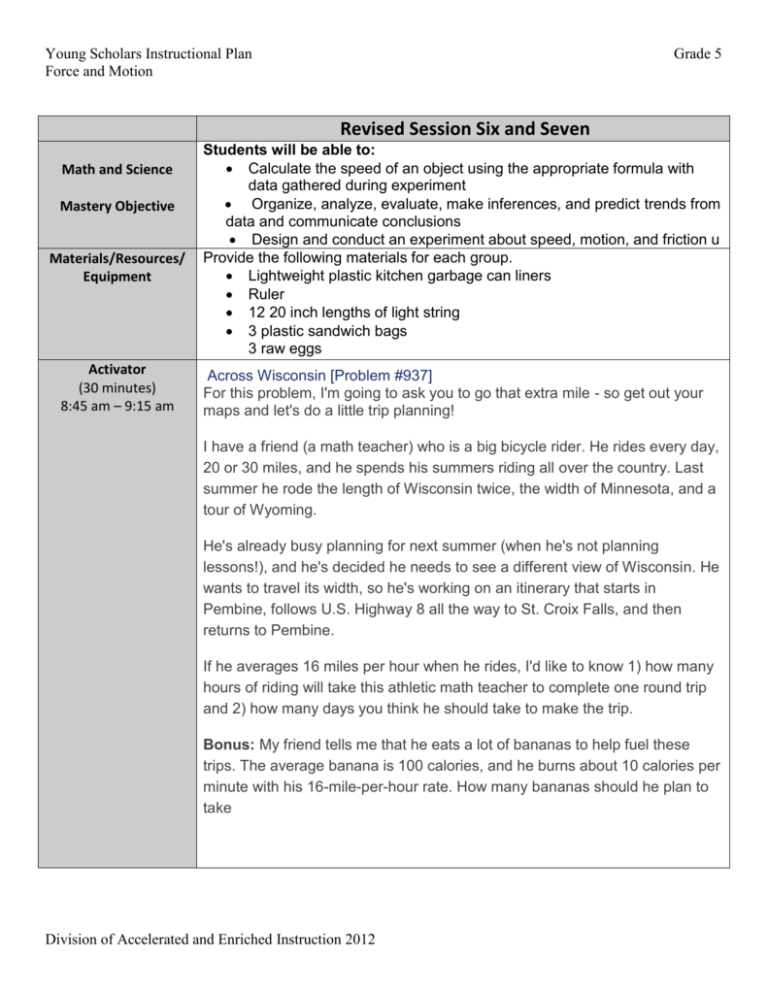
Young Scholars Instructional Plan Force and Motion Grade 5 Revised Session Six and Seven Math and Science Mastery Objective Materials/Resources/ Equipment Activator (30 minutes) 8:45 am – 9:15 am Students will be able to: Calculate the speed of an object using the appropriate formula with data gathered during experiment Organize, analyze, evaluate, make inferences, and predict trends from data and communicate conclusions Design and conduct an experiment about speed, motion, and friction u Provide the following materials for each group. Lightweight plastic kitchen garbage can liners Ruler 12 20 inch lengths of light string 3 plastic sandwich bags 3 raw eggs Across Wisconsin [Problem #937] For this problem, I'm going to ask you to go that extra mile - so get out your maps and let's do a little trip planning! I have a friend (a math teacher) who is a big bicycle rider. He rides every day, 20 or 30 miles, and he spends his summers riding all over the country. Last summer he rode the length of Wisconsin twice, the width of Minnesota, and a tour of Wyoming. He's already busy planning for next summer (when he's not planning lessons!), and he's decided he needs to see a different view of Wisconsin. He wants to travel its width, so he's working on an itinerary that starts in Pembine, follows U.S. Highway 8 all the way to St. Croix Falls, and then returns to Pembine. If he averages 16 miles per hour when he rides, I'd like to know 1) how many hours of riding will take this athletic math teacher to complete one round trip and 2) how many days you think he should take to make the trip. Bonus: My friend tells me that he eats a lot of bananas to help fuel these trips. The average banana is 100 calories, and he burns about 10 calories per minute with his 16-mile-per-hour rate. How many bananas should he plan to take Division of Accelerated and Enriched Instruction 2012 Young Scholars Instructional Plan Force and Motion Sensory Break 9:15 am – 9:45 am Grade 5 http://player.discoveryeducation.com/index.cfm?guidAssetId=27DE45E99B3D-478E-A546-D893FC4D2B92&blnFromSearch=1&productcode=US Discovery Education Video: Basics of Physics: Exploring the Laws of Motion First 3 segments Note: Decide how you wish to break up the segments between the session six and seven. Science Lesson (55 minutes) 9:50 am – 10:45 am Pre-Conceptions Students typically have many pre-conceived notions regarding concepts in Physics. It has always proven useful to bring these ideas to the forefront of your mind and to make an effort to evaluate their correctness. Complete the Pre-Conception 7 questions T/F about Force and Motion. Review answers after session six. Note: Remind students to make connections to the Wheel of Scientific Investigation and Reasoning. Session 5 might be designing the experiments, while session 6 would be conducting the experiment. Design and Conduct Experiment 1. Divide your class into several small groups, and distribute materials to each group. 2. Have students use the following directions to build three “parachutes” for an ordinary chicken egg: - From a lightweight plastic kitchen garbage-can liner, cut out three squares. Make one square 10”x 10”, a second square 20” x 20”, and a third square 30” by 30”. - Make a parachute out of each square by tying a piece of string to each corner of the square, then attaching the other ends of the strings to a plastic sandwich bag. - Place a raw egg in each of the sandwich bags. Ask Questions and Make Observations 3. Ask students to predict which egg has the best chance of surviving a drop from about ten feet from the floor. Students should explain the reasoning behind their predictions. 4. Have students drop each unfurled egg parachute from a height of ten feet, and then determine whether or not their predictions were confirmed. 5. After each group has performed its experiment, ask students to describe the changing forces that acted on the parachutes as they fell and the resulting changes in the parachutes' motion. How did the falls of the larger parachutes differ from the falls of the smaller ones? 6. Review with students that gravity pulled the parachutes downward; air resistance worked as an opposing force to gravity; the parachutes accelerated until the air resistance equaled the gravity, at which point the parachutes reached terminal speed; the bigger parachutes with a larger area fronting the wind created more air resistance than the smaller ones, so the bigger parachutes reached terminal speed earlier . Division of Accelerated and Enriched Instruction 2012 Young Scholars Instructional Plan Force and Motion Grade 5 DISCUSSION QUESTIONS: Create Meaning 1. Define the terms speed and acceleration. Explain how the two terms are related. 2. How can creating and analyzing graphs be useful for understanding forces and motion in objects? 3. Construct a position-versus-time graph for the following set of data: (D1= 0 m, T1= 0 sec), (D2= 7 m, T2= 3 sec), (D3= 14 m, T3= 6 sec), (D4= 21 m, T4= 9 sec), and (D5= 28 m, T5= 12 sec). Discuss how you would use this graph to determine the speed of the object being represented. 4. Is the object represented in question 3 moving with constant speed or constant acceleration? Explain how you arrived at your conclusion. 5. Debate what assumptions might be made about the unknown forces that are acting on the object represented by the graph in question 3. Explain the reasons for each of your assumptions. 6. If the object in question 3 continued to move, explain how you might use the graph, its gradient, and the data plotted on its x- and y-axes to determine how far the object would travel in 19.5 additional seconds. 7. From the graph constructed in question 3, calculate the object's speed at three-second intervals, then use this new information to construct a speedversus-time graph for the object. Closure (15 minutes) 10:45 am-11:00 am Have each student complete the exit ticket “What did I learn today?” Once students complete their exit ticket, collect them, and prepare for dismissal. Division of Accelerated and Enriched Instruction 2012
